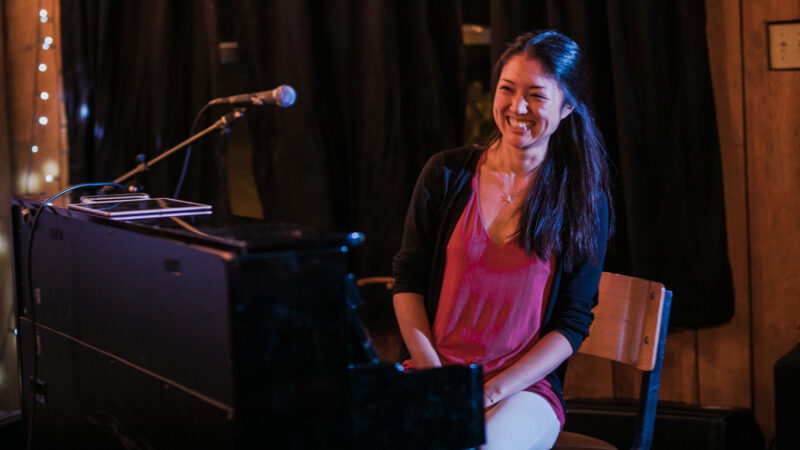How a pianist is using classical music to bridge divides in Alabama
By Kelsey Shelton, Reflect Alabama Fellow
For some people, classical music can be an unapproachable genre. Classically trained concert pianist, Miki Sawada, is aware of the impression classical music can impart on listeners. She has prestigious places on her resume including Yale University and Carnegie Hall.
“It can come with a lot of baggage with who it’s associated with. Traditionally, for example, we play a lot of music by white dead men from Europe. But classical music now, in 2023, is so much more than that,” she said.
The 2016 election sparked a change in her. The country was divided, and that division led her to an unlikely place – a U-Haul rental facility. She loaded an out-of-tune piano onto a van. Then she set out on a tour hoping to connect Americans using classical music.
“I think a lot of people’s reaction was to kind of ‘other’ the other people that were on the other side of the political spectrum or living in ways they weren’t familiar with,” Sawada said.
Sawada embarked on her Gather Hear tour in 2017. She planned to travel across all 50 states, performing classical music concerts for free in community gathering spaces rather than concert halls. She’s played at homeless shelters, churches, parks and nursing homes. She has toured five states so far. Alabama is her sixth. Her intention is to thoroughly explore every state, especially cities that don’t receive as much coverage.
“Instead of pushing people who are different from me away from me, I thought maybe I could use music as a way to truly get to know people in this country all across the socioeconomic and political divide,” she said.
For her shows in Alabama, she wanted to visit communities that are most in need of live music. Many are under-resourced and in rural areas. She also included incarcerated people with a performance at Staton Correctional Facility.
“As I found out in Louisiana, incarceration is a big issue in these states, Louisiana, Alabama. And I understand that so many people end up in prisons potentially for unjust reasons. I didn’t want to exclude that population from my tour because I’m really trying to reach everyone that represents Alabama,” she said.
Many locations where Sawada played are in majority Black communities. With that in mind, her set list features Black composers Florence Price, George Walker and William Grant Still. The pieces are paired with poetry by Alabama poets. She also has arrangements of African-American spirituals.
“Programmatically, I guess this time what feels most pertinent to me is that I’m finishing the whole program with ‘Deep River,’ which is, of course, singing about freedom on the other side of the Jordan River,” Sawada said.
She’s performed the spiritual at varying locations, from Japanese internment camp sites to underfunded Native American reservations. Though the song was written about freedom from slavery, it has remained relevant for a diverse group of people. She said it feels even more relevant now, during the Israel-Hamas conflict.
“Since I started the tour in 2017, the country has changed. I’ve changed as a person and performer. So the content of the show always tries to reflect what’s going on in the moment,” she said. “I definitely think about everything that’s happening currently while I’m on the tour. Because this tour is really like a living, breathing thing.”
That’s because Sawada is documenting the tour through video, blogs and social media. The tour’s website and YouTube channel are dedicated to highlighting the intimate moments she has shared with strangers. One show in Louisiana, ended with a duet of Amazing Grace with an unhoused person. In Marion, Alabama, Performances included young ballerinas.
“The documentation is almost as important as the in-person performance, because I wanted to personally get to understand America,” she said, “but also share what I’ve found to a broader audience that’s national, that’s international and show them: this is what America looks like.”
She hopes the tour will introduce America to a new side of classical music. One that shows the complexity of the genre – from the depth that can be created with one woman and a piano, to the power it has to bring people together during a time of isolation and division.
Click here for more information about Sawada’s Gather Hear tour in Alabama.
Tropical Storm Chantal strengthens slightly as it nears landfall in South Carolina
Tropical Storm Chantal grew in strength as it approached the southeast U.S. coast. It's forecasted to bring heavy rains to parts of the Carolinas on Sunday.
Dalai Lama, a global symbol of Tibetan culture and resistance, turns 90
The Dalai Lama turned 90 on Sunday surrounded by thousands of followers, who thronged the Himalayan town of Dharamshala.
Iran’s supreme leader makes first public appearance since Iran-Israel war started
Iran' s Supreme Leader Ayatollah Ali Khamenei on Saturday made his first public appearance since the 12-day war between Israel and Iran began, attending a mourning ceremony on the eve of Ashoura.
At least 43 dead in catastrophic Texas flooding and dozens missing from girls camp
Flash flooding slammed the Texas Hill Country overnight on Friday. At least 27 girls from a summer camp next to the Guadalupe River remain missing.
How this long-lost Chinese typewriter from the 1940s changed modern computing
The concepts in the MingKwai typewriter underlie how Chinese, Japanese and Korean are typed today. The typewriter, patented in 1946, was found last year in an upstate New York basement.
North Korea has a new luxury beach resort. But the country isn’t open to most tourists
North Korean leader Kim Jong Un said he wants the luxury resort on the eastern seacoast to become a "world destination," but the country has been reluctant to allow in foreign tourists.









